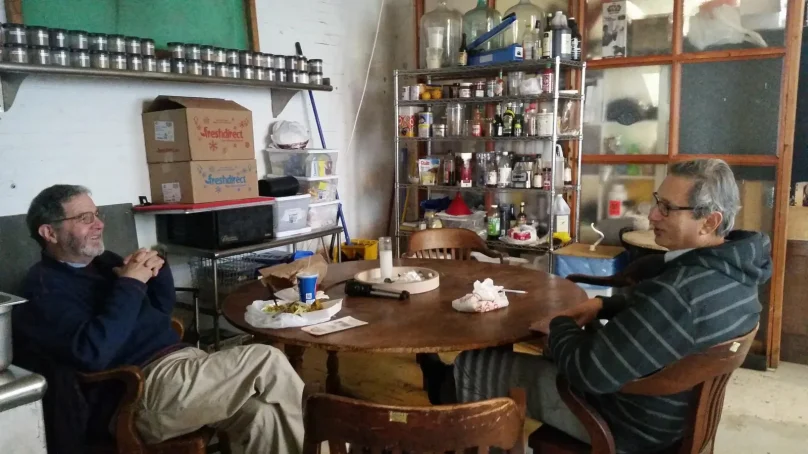
Despite the Make America Healthy Again (MAHA) fandom, every biohacker I spoke to, like Dave Asprey – the convenor of the 2025 Biohacking Conference – said they were apolitical.
Biohacking Conference is a symposium of tech brothers, wellness influencers, psychonauts and scientists, all hoping to thwart the ravages of time with unorthodox – and often unproven – medical treatments. MAHA itself, they insist, is apolitical.
One thing that gives biohackers momentum is the trace of snake venoms that are currently used in FDA-approved drugs and have been found to be effective in stroke treatment.
What could possibly be partisan about wanting healthy kids? Having energy and vitality and a high quality of life? My only heated exchange over the conference’s three days was with Siggi Clavien, founder of Equilibrium Labs, the company that scanned my new-born baby liver.
“Preserving, progressing, and saving the health of the children of this nation – that’s what MAHA is. And if you take a side on that either way politically, you don’t understand what we’re doing. And how dare you take that aspect, and challenge us trying to help children’s health?” (Clavien asks me “how dare you” three times over the course of our short interview.)
For the biohackers, decentralisation is a feature, not a bug. It’s a safeguard against corruption. “The biohacking community,” Fabrizio “Fab” Mancini, a chiropractor and frequent flier of the daytime TV medical circuit, tells me, “is not owned by any one entity. It’s actual individuals.” In a community for whom deregulation is entirely the point, though, how do you screen for bullshit?
I ask Asprey about the vetting process for the slew of vendors and speakers hawking treatments on his trade show floor, many of them expensive, few FDA-approved. “I don’t look at anything as being fringe,” he tells me. “It’s either known or unknown, and it has evidence or it doesn’t.”
On the last day of the conference, I attend a talk on snake venom. A man named Sincere Seven is extolling the medicinal virtues of microdosing viper, cobra and rattlesnake venoms directly into his patients’ bloodstream.
“The snake heals its prey before it kills its prey,” he claims, before personifying the serpent. “I inject venom into you that will induce a rapid healing. Flood the body with white blood cells, kill off viruses, kill off bacteria, kill off tumours, and kill off cancers – because I don’t wanna eat that.”
Seven is asked by an audience member if snake venom could be used to treat autism. While he hadn’t personally tested it yet, Seven stresses, “I’m willing to work with anybody … Me and my colleagues, we are the clinical trials.”
“Oh, my gosh,” a woman breathes in the audience. Whether she is moved or horrified, I can’t tell.
At the end of the day, I get it. It’s not fair to say that I hate my body, exactly – the thing certainly has its merits, and what’s more, biohackers talk constantly of the power of positive language in manifesting your reality – but we’ve never really hit it off. One of my earliest memories involves my parents calling 911 when I had breathing trouble, the paramedics looming over me so tall I swear they scraped the ceiling.
In college I was walloped with Lyme disease, my wrists frozen stiff one morning to the point that I couldn’t open my dorm room door. I’ve broken several bones, had a (non-cancerous) lesion removed from my scalp, passed a kidney stone. I have insomnia and depression and a perpetually swollen ankle. I’ve had Covid at least five times. As of this writing, I’m days away from an appointment with my dermatologist, who’ll carve a portion from my back to determine whether or not I have skin cancer.
Part of me really wants to endorse a grand arsenal of magic bullets. I am sick, and I am tired, and I want answers. I, too, long to throw up my hands and write off Western medicine in all its byzantine expense, to embrace something different and eccentric and even expensive, as long as it means getting healed at last.
There are other, better ways to transform health care, of course – ways that could lastingly help the millions who can afford neither chemotherapy nor a cryochamber – like universal health care, stronger regulation of the pharmaceutical industry, and a system more focused on preventative medicine. But these reforms will take political courage and considerable time. Instead we find ourselves entrenched ever further in a culture war, with politicians placing science in its crosshairs.
This, at its core, is the biohackers’ dilemma. Over and over at the Fairmont, I hear of the need for evidence-based science in medicine: for clinical trials and citations in the JAMA and double-blind placebo tests. In practically the same breath, I hear the vehement dismissal of evidence using those very safeguards – such as those used to develop vaccines – when it doesn’t square with the biohackers’ ideals. Although “Live Beyond 180” is a sleek-enough slogan for this crowd, another strikes me as equally fitting: “Science is dead, long live science.”
“The bottom line,” Dr Fab says, “is that anybody can actually put up a booth and actually sell whatever they feel. That’s where an informed consumer is the key.”
But that’s a hell of an ask. Information, as we know all too well by now, ain’t what it used to be.
- A Tell report / By Will Bahra / Adapted from Wired







